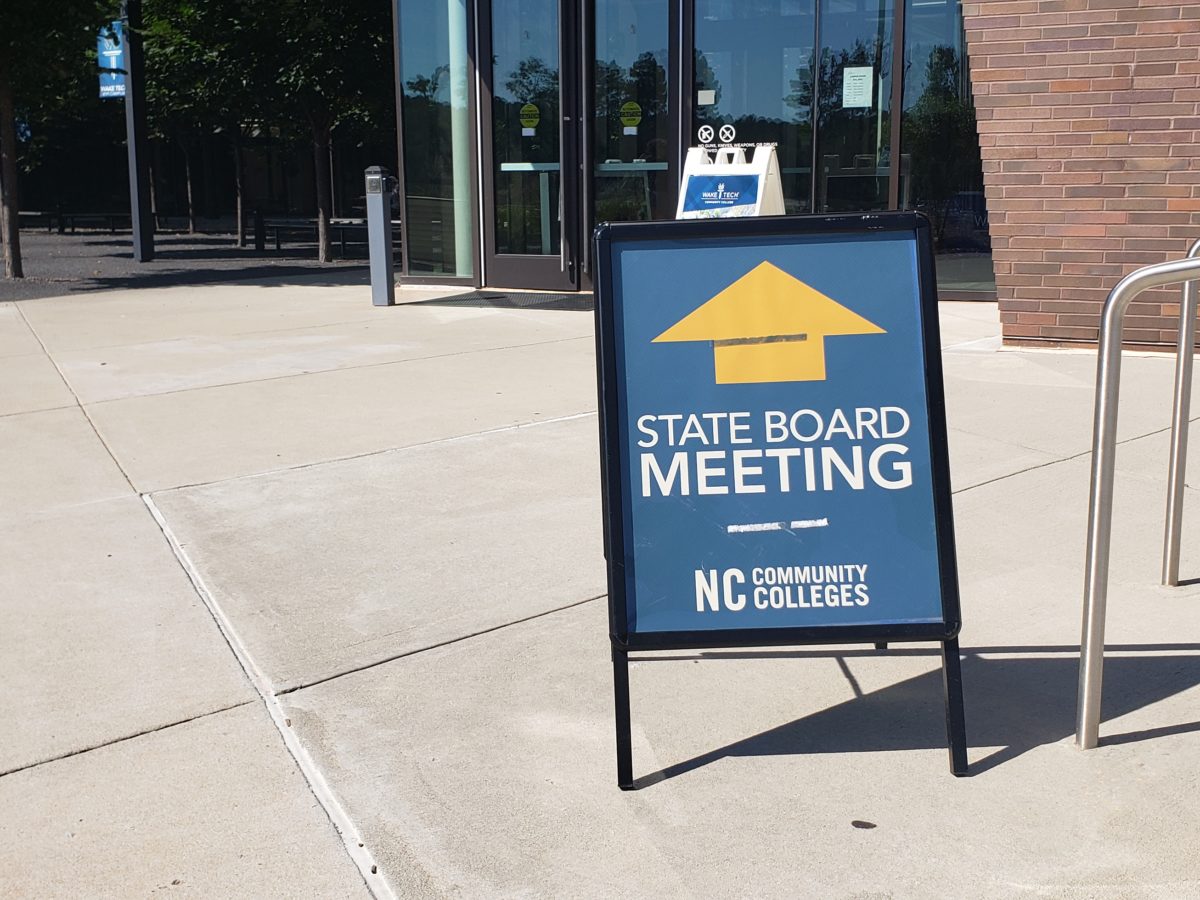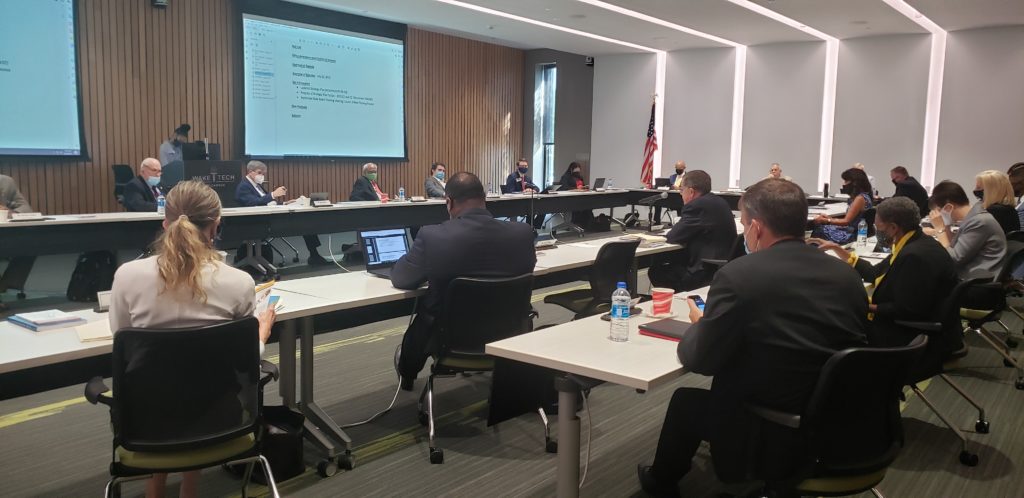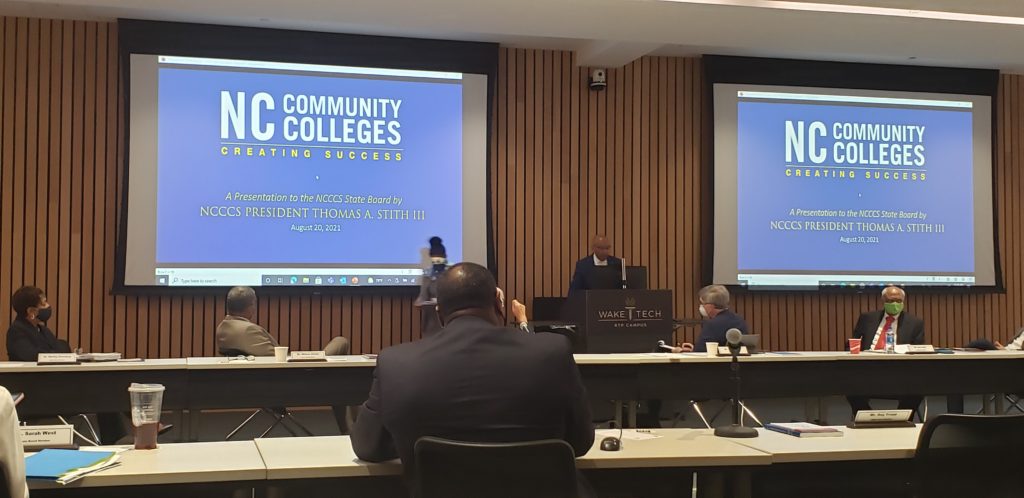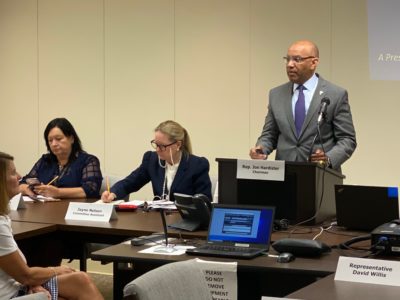
|
|
The State Board of Community Colleges met last week on the heels of the first week of classes for the fall semester for many colleges.
“Other than an earthquake, and other than a global pandemic, tornado warnings, and flooding, I think we had a pretty good week,” said Dr. Mark Poarch, president of Caldwell Community College and Technical Institute and new president of the N.C. Association of Community College Presidents.
On top of these challenges, the state still hasn’t passed a budget, which means the community college system is operating using its base budget.
Last year, the system received $41 million in one-time coronavirus relief funds along with other nonrecurring funds that will not necessarily be available this year. The baseline budget is also based on full-time enrollment, which suffered a steep decline last year after increasing in 2019-20 for the first time in years.
Both the House and Senate budget proposals include budget stabilization funds, however, so the system is optimistic that this will be a short-term challenge.
During his remarks, system president Thomas Stith said he is still concerned about enrollment declines. The system saw a 10% drop over the last year, which exacerbated a trend from before the pandemic, he said.
He highlighted programs like the Longleaf Commitment Grant as a way to address some of these issues.
Other highlights from the meeting include:
- Updates to a uniform articulation agreement for early childhood education.
- Initial results from the College and Career Readiness Graduates Program.
- Reactions to audit findings from last month concerning Roanoke-Chowan Community College and Rowan-Cabarrus Community College.
Appointments
The House approved two appointments to the State Board of Community Colleges last week.
Vice Chair Bill McBrayer has been reappointed, alongside M. Lee Barnes Jr. of Durham County. This will be McBrayer’s second six-year term. He is the human resources manager of Lexington Home Managers. Barnes has previously served on the Appalachian State University Board of Trustees and is the president and director of M.M. Fowler Inc., a corporation that owns and manages gas station convenience stores.
The two will serve until June 30, 2027.
McBrayer said he is grateful to serve on the Board again.
“I’ve been to 46 of the 58 colleges, and every time I step foot on a campus, I’m amazed at what all they do,” he told EducationNC. “As President Stith says, we don’t want to be the best-kept secret in North Carolina. Our goal is to tell the country, let alone North Carolina, what a great job we’re doing in each community.”
The Senate is expected to vote on two additional appointments this week.

Uniform articulation agreement
After approving a teacher preparation articulation agreement at its meeting last month, the Board approved updates to a similar agreement with the UNC System regarding early childhood education.
In 2018, the UNC and NC Community College systems entered into an agreement that would allow students to transfer credits toward a bachelor’s degree in an early education program and eventually obtain a teacher license.
Since 2013, the program has had almost 8,000 graduates, said Dr. Kim Gold, chief academic officer for the system. Of these, 1,700 enrolled in a full-year program within one year of graduating, and 59% transferred to a UNC System school.
The update to the agreement simply clarifies the role of the program’s advisory committee and provides instruction on how to conduct reviews.
Part of the challenge for this program is getting educators into the pipeline in the first place. The Board acknowledged some of the struggles early childhood educators are facing, such as low wages.
“This is such a significant partnership, but also a very important component of what we need in order to get done what we need to get done for children,” Board member Dr. Shirley Carraway said.
Audits
After hearing an overview of audits at two community colleges last month, Board members spent part of their August meeting discussing the role of trustees and how to help these institutions rebuild.
The state auditor investigated Roanoke-Chowan Community College and Rowan-Cabarrus Community College.
For Rowan-Cabarrus, the biggest problems were a lack of monitoring that led to errors and turnover within the business office. The auditor’s report found that the college’s financial statements contained significant misstatements and were not independently reviewed, and these mistakes led to an increased risk of fraud.
Bryan Jenkins, senior vice president of external and State Board affairs, told the Board that he met with the college’s president, Dr. Carol Spalding.
“She is encouraged with where they are, cautiously optimistic that they will have all their positions filled here in short order, and moving forward anticipates some — to use her words — a calming of the challenges,” he said.
There are no state-specified requirements for internal audits, Jenkins told the Board. Some of the larger colleges have positions dedicated to the process, but most don’t — largely due to funding constraints, he said.
For the Board members, the conversation came down to why the Rowan-Cabarrus Board of Trustees didn’t intervene sooner.
Members like William Holder said the Board should be helping trustees understand these complicated processes, particularly if a college is struggling to retain a qualified CFO that can manage the process.
“If we’re going to continue to do things the way we’ve done them, we probably shouldn’t expect different results,” Holder said.
Others like Carraway pointed out that the trustees could have been monitoring vacancies to intervene sooner about the turnover issues.
But it got more complicated when the Board turned to the Roanoke-Chowan report.
“I’ve seen a lot of audits come and go,” Board Member Burr Sullivan said. “Both of these audits are textbook examples of what happens when you have turnover in the control staff.”
He said the two schools were like night and day.
The auditor’s report for Roanoke-Chowan found that from August 2019 to August 2020, the college issued over 2,600 checks totaling $10.3 million with invalid signatures. These checks had digital signatures from the former president and controller, even though they were no longer employees.
“According to the former interim President,” the report reads. “She became aware of the invalid signatures in January 2020 after she filled the Controller position. However, the signatures were not updated until August 2020.”
Updating the signatures is the job of the CFO, a position that was vacant at the time.
“The problems we’ve had at Roanoke-Chowan for eight years are much more difficult to solve,” Burr said, referencing high turnover in the college presidency over the past five years.
Roanoke-Chowan’s report also found that the college overpaid the salary of three employees for a total of $45,008 and submitted late retirement contributions, resulting in $3,564 in penalty fees.
The reports recommended that staff should be adequately trained, that the Board of Trustees is ensuring the president is doing their job, and that the president should fill positions in a timely manner.
Jenkins also met with Roanoke-Chowan’s new president, Dr. Murray Williams, and is optimistic. Stith also met with President Williams and affirmed that she was focused on the college’s future and ensuring these mistakes were not repeated.
There’s a lot of blame to go around, Board Chair Dr. Breeden Blackwell said, including toward the system itself. The Board needs to intervene when the pot is simmering, not when it has already boiled over, he said.
Now, he said he’s committed to helping the college move on.
“It’s not a lost cause,” he said.

Career and College Ready Graduates
The Board approved a report that will be sent to the Joint Legislative Education Oversight Committee in October about progress within the Career and College Ready Graduates (CCRG) Program.
The program, which has been in the works since 2015 and rolled out at the start of this year, is meant to remediate students in certain subject areas. The community colleges develop course content that then is delivered at high schools across the state.
The legislature, however, has not allocated any funding for this program. This is one reason Department of Public Instruction officials say the program has taken so long to implement, and the report highlights lack of funding as a challenge to the program’s future.
The House budget proposal includes $546,500 in recurring funds for the program, some of which would support a program administrator.
For the spring semester, 5,200 students were enrolled in English CCRG classes, and 4,736 were enrolled in math classes.
Here’s how many credits these students earned:
- English Tier 1 Credits: 206.
- English Tier 2 Credits: 38.
- Math Tier 1 Credits: 1,562.
- Math Tier 2 Credits: 854.
- Math Tier 3 Credits: 546.
This means 62.5% of students participating in math classes, and only 5% of students participating in English, are ready for college-level classes, according to the testing platform.
Tiers reflect the advancement of the course they received credits for.
State Board members asked why English credits were so far behind math. Gold said the system is still looking at the data, but they believe more training is needed for teachers to effectively administer the program and prepare students for the test.
The community college side actually has more success with math, she said.
“We have found, as with any tool, the higher the comfort level our faculty have in using the platform and helping students as they look at the different tiers is important,” she said.
The program uses the online platform NROC, which allows students to learn at their own pace while also receiving instruction from a teacher.
Not all school districts have launched the program. They have until the end of the year to do so.
The State Board of Education now has to approve the report.
What’s next?
The Board’s next meeting is Sept. 15-17. One of these days will be devoted to a strategic planning retreat, as the Board reviews the progress that has been made on its goals.
Over the course of the next few weeks and months, System staff plan to hold regional meetings to get more localized feedback on the plan and what updates should be made. They hope to complete this plan in July.





